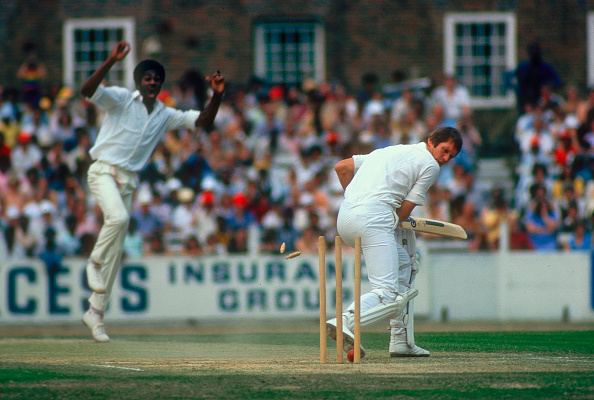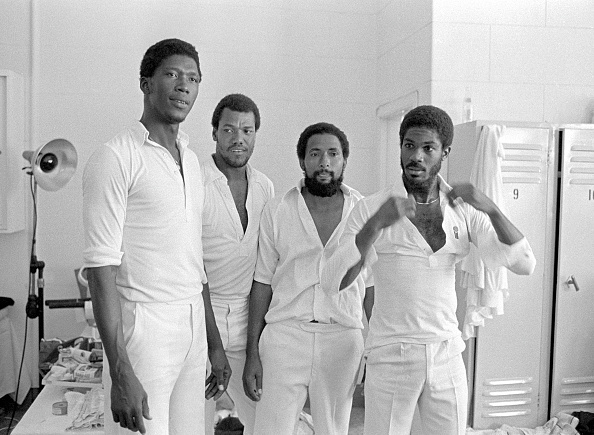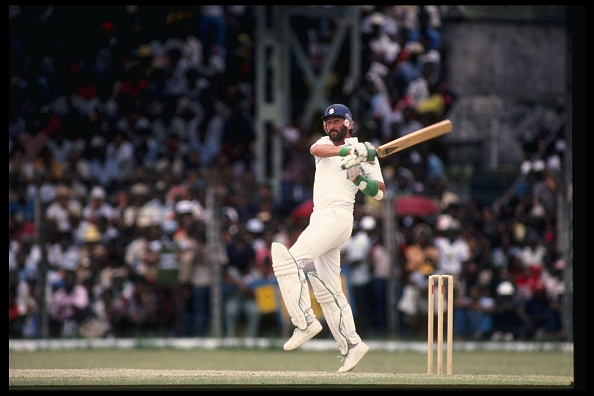
Stats: Who was the best batsman vs West Indies between 1980 and 1995?
For about three decades since the resumption of cricket after World War II, spinners dominated the scene. From 1950 to 1973, Spinners bowled 49.05% of all balls bowled in Test matches; the highest percentage share for them during any time period since the 1900s. This was a time when containing the opposition was the preferred tactic over dismissing the opposition, evident from the overall runs per over (RPO) of 2.30 (1950s) and 2.49 (1960s) - which have been the lowest in the 20th century.
The pattern changed with the emergence of Dennis Lillee and Jeff Thomson, two bowlers on the back of whom Australia asserted complete dominance over any/all opposition. One of the teams which suffered the pace battery was Clive Lloyd’s touring West Indies in 1975/76. A Few months after West Indies had won the inaugural One Day World Cup in 1975, West Indies’ tour of Australia later that year was dubbed as the unofficial World Championship of Test Cricket.
The West Indies crumbled to their (then) most comprehensive series defeat of all time. This experience, coupled with the famous defeat vs India at Port of Spain made it clear to Clive Lloyd that the only way to be world beaters was to adopt the Australian fast bowling formula.
Throughout the late 70s and 1980s, West Indies fast bowlers were the most talked about (and feared) thing in Cricket. Along with an appreciation of their awe-inspiring talent, there was criticism of the intimidating bouncers and beamers they hurled at many a hapless batsmen. Irrespective of the debate about the legitimacy of their style of bowling, scoring runs against the West Indies was the toughest of all propositions, and hence, was the gold medal of batsmanship.
Who then, were the most successful batsmen against the West Indies?
Sunil Gavaskar’s 13 Test centuries against West Indies is put up as the most impressive number from his stellar Test record, but one must remember that Gavaskar scored 8 of those centuries against relatively docile bowling line-ups in 1971 and 1978. His record against the four-pronged pace attack, although very impressive, is not the stuff of legends it’s often thought to be (as is shown in the analysis below).
From 1980 onwards; when the West Indies’ unbeaten series run began, till 1991; when it’s most formidable players in Richards, Greenidge, Marshall and Dujon retired, Graham Gooch emerges as the best batsman vs West Indies. Not only did he score the most runs against them, but he also had the highest average and also the most centuries (5), after Allan Lamb (6).
Table 1: Top Averages vs West Indies (Jun 1980 - Aug 1991) , Qual – 750 Runs
| Batsman | Matches | Innings | Runs | Average | 100s | 50s |
| Graham Gooch | 26 | 51 | 2197 | 44.83 | 5 | 13 |
| Allan Border | 23 | 44 | 1636 | 44.21 | 2 | 11 |
Dilip Vengsarkar | 17 | 28 | 1119 | 43.03 | 4 | 6 |
| David Boon | 13 | 24 | 795 | 36.13 | 2 | 4 |
| Allan Lamb | 22 | 42 | 1342 | 34.41 | 6 | 2 |
| David Gower | 19 | 38 | 1149 | 32.82 | 1 | 6 |
| Ravi Shastri | 19 | 33 | 847 | 30.25 | 2 | 2 |
| Kapil Dev | 19 | 32 | 750 | 25.00 | 2 | 2 |
| Ian Botham | 20 | 38 | 792 | 21.40 | 0 | 4 |
If we reduce the cut off runs to 500, only Robin Smith (50.57) and Martin Crowe (45.33) have better averages than Gooch but they played in far lesser number of matches. Even if the cut off period is extended to the end of the West Indies’ unbeaten run (March 1995), Gooch still remains the most formidable batsman vs West Indies.
In fact, Gooch now emerges as the highest averaging batsman as well, helped by the below par performance of Robin Smith in the 1994 series, which brings his average down from 50.57 to 44.69.
Table 2: Top Averages vs West Indies (Jun 1980-Mar 1995), Qual – 750 Runs
| Batsman | Matches | Innings | Runs | Average | 100s | 50s |
| Graham Gooch | 26 | 51 | 2197 | 44.83 | 5 | 13 |
| Robin Smith | 15 | 27 | 1028 | 44.69 | 3 | 6 |
| Dilip Vengsarkar | 17 | 28 | 1119 | 43.03 | 4 | 6 |
| David Boon | 19 | 35 | 1305 | 42.09 | 3 | 7 |
| Allan Border | 28 | 53 | 1934 | 42.04 | 3 | 13 |
| Allan Lamb | 22 | 42 | 1342 | 34.41 | 6 | 2 |
| David Gower | 19 | 38 | 1149 | 32.82 | 1 | 6 |
| Javed Miandad | 15 | 26 | 831 | 31.96 | 2 | 4 |
| Ravi Shastri | 19 | 32 | 847 | 30.25 | 2 | 2 |
| Kapil Dev | 19 | 32 | 750 | 25 | 2 | 2 |
One of the hallmarks of a good batsman is consistently scoring well against good bowling attacks. In the table above there are 5 batsmen averaging more than 40, suggesting that they did master the West Indians. But were the averages spurred only by one or two good rubbers?
A series by series look at the aggregates only solidifies Gooch’s status as the best player vs West Indies. His average (44.83) appears all the more remarkable when it is seen that he played in the most series (6) along with Allan Border and although Border’s average (42.04) is commendable too, Gooch’s average dipped significantly in only one series – 27.60 in 1985/86 ( compared with 4 such instances for Border), and in no other series did his average drop below 39.40 (1980).
The only other batsman whose averages show some consistency is David Boon. For other batsmen in the list, their averages were propped up by one good/outstanding series, but this is not the case with Gooch.
Gooch was also had the lowest difference between home and away average vs West Indies after Allan Lamb, Ravi Shastri and Kapil Dev. But the averages of these three batsmen is significantly lower than Gooch’s. Amongst batsmen with an overall average of more than 40, Gooch’s difference is the easily the least (6.46) followed by Allan Border (16.36) and Robin Smith (21.86).
Table 3: Averages at Home and West Indies (Jun 1980-Mar 1995), Qual – 750 Runs
| Batsman | Overall Average | At Home | In West Indies | Difference |
| Graham Gooch | 44.83 | 47.60 | 41.14 | 6.46 |
| Allan Border | 42.04 | 36.70 | 53.06 | 16.36 |
| Allan Lamb | 34.41 | 36.11 | 33.09 | 3.02 |
| David Gower | 32.82 | 22.38 | 43.88 | 21.50 |
| Dilip Vengsarkar | 43.03 | 66.36 | 25.93 | 40.43 |
| David Boon | 42.83 | 46.31 | 33.25 | 13.06 |
| Ravi Shastri | 30.25 | 27.56 | 33.83 | 6.27 |
| Ian Botham | 21.40 | 27.55 | 14.17 | 13.38 |
| Kapil Dev | 25.00 | 22.50 | 28.75 | 6.25 |
| Robin Smith | 44.69 | 58.00 | 36.14 | 21.86 |
| Javed Miandad | 31.96 | 26.81 | 40.20 | 13.39 |
Table 4: Series by Series Averages
| Batsman | Series 1 | Series 2 | Series 3 | Series 4 | Series 5 | Series 6 |
| Graham Gooch | 39.40 (1980) | 57.50 (1981/82) | 27.60 (1985/86) | 45.90 (1988/89) | 42.66 (1989/90) | 60.00 (1991) |
| Allan Border | 67.20 (1981/82) | 74.42 (1983/94) | 27.33 (1984/85) | 32.25 (1988/89) | 34.37 (1990/91) | 33.11 (1992/93) |
| Allan Lamb | 42.88 (1984) | 22.40 (1985/86) | 42.33 (1988/89) | 55.71 (1989/90) | 15.71 (1991) | |
| David Gower | 10.50 (1980/81) | 53.71 (1981/82) | 19.00 (1984) | 37.00 (1985/86) | 30.14 (1988/89) | |
| Dilip Vengsarkar | 31.00 (1983) | 53.12 (1983/84) | 101.66 (1987/88) | 18.33 (1989/90) | ||
| David Boon | 26.40 (1984/85) | 45.11 (1988/89) | 36.14 (1990/91) | 61.25 (1992/93) | ||
| Ravi Shastri | 39.33 (1983) | 33.60 (1983/84) | 17.50 (1987/88) | 28.33 (1989/90) | ||
| Ian Botham | 18.77 (1980/81) | 10.42 (1981/82) | 34.70 (1984) | 16.80 (1985/86) | 35.00 (1991) | |
| Kapil Dev | 42.33 (1982/83) | 16.72 (1983.84) | 31.57 (1987/88) | 15.16 (1989/90) | ||
| Robin Smith | 26.50 (1988/89) | 37.20 (1990/91) | 83.20 (1991) | 35.55 (1994) | ||
| Javed Miandad | 32.85 (1980/81) | 29.33 (1985/86) | 56.40 (1988) | 7.66 (1990/91) | 24.00 (1992/93) |
It is said that greater the opposition, mightier is the achievement against them. Whether it was scoring a swashbuckling first century (123) at Lord’s in 1980, defying Ambrose and Marshall to score 146 at Trent Bridge (1988) or playing one of the greatest Test innings in a match and series defining 154 at Leeds in 1991, Graham Gooch reserved, his best against the best bowling attack in the world.
While his susceptibility against the swing of Terry Alderman (1989) is famous for its fallibility, his sturdiness against the West Indian quickies is not so well known.


